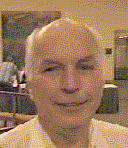(Died: July 7, 2013)
Independent Researcher, Inventor
Interests: Charge Clusters, Exotic Vacuum Objects, Superluminal Electrons
For several years Kenneth R. Shoulders has been an independent scientist working to unravel the secrets of high-density charge clusters. Recently, Ken Shoulders obtained and analyzed samples of cathode materials from different operating cold fusion cells and found evidence of many strikes by high-density charge clusters. Here is how Shoulders explains the role of these charge clusters in cold fusion: Deuterium is loaded into a malleable palladium cathode by electrolysis. The palladium becomes stressed and hydrogen-embrittled. At some random times the palladium cracks. Trillions of ionic bonds in the metal lattice are broken resulting in a very short-duration high voltage across the crack. This cracking promotes the fracto-emission of high-density charge clusters (Ken Shoulders' "EVs") The charge cluster or clusters pick up deuterons, race across the crack, slam into the opposite wall, and the highly-accelerated piggy-back deuterons have sufficient energy to cause a nuclear reaction. The end result is the formation of many new elements and excess heat. This phenomenon is not d + d fusion but d + Pd fusion. (See K. Shoulders and S. Shoulders, "Observations on the Role of Charge Clusters in Nuclear Cluster Reactions," J. of New Energy, Fall 1996.)
Some who heard Shoulders' presentation at the second conference on Low-Energy Nuclear Reactions (Sept. 1996, College Station, Texas) were impressed with two concepts: First, the concept of fracto-emission and the resultant nuclear reactions that could be a major source of excess energy in various types of cold fusion devices. Second, the concept that it is much easier to make charge clusters directly than to create charge clusters by fracto-emission. Please note: this explanation of the source of most (or some) of the excess energy in cold fusion devices is standard textbook physics and, therefore, immediately understandable to anyone who is familiar with the formation and use of high-density charge clusters. (For further information on charge clusters see Kenneth Shoulders' U.S. Patent 5,018,180). It should be noted that as a result of the presentation of the paper by Kenneth Shoulders, at least one improvement patent application has been filed.
Websites:
- Ken Shoulders: Electrum Validum by Rex Research (Robert A. Nelson)
- Charge Clusters: The Work of Ken Shoulders by William Zebuhr, Infinite Energy, #61, p. 7 (May/June 2005).
- Ken Shoulders' EVOs - Exotic Vacuum Objects Challenge Particle Theory by Sepp Hasslberger
- New Energy Scientists of the Year, 1996 by Hal Fox
- A Demonstration of 'Charge Cluster' Phenomena by Hal Fox to Bill Beatty (Dec 2000)
- "On microelectronic components, interconnections, and system fabrication", Proc. Western Joint Computer Conference, National Press, Palo Alto, CA, 1960, pp. 251-258.
- "Microelectronics using electron-beam-activated machining techniques", in Franz Alt, ed., Advances in Computers, Academic Press, New York, 1961, pp. 135-293.
- "On microelectronic components, interconnections, and system fabrication", in C.A. Muses, ed., Aspects of the Theory of Artificial Intelligence, Plenum Press, New York, 1962, pp. 217-235.
- "Toward complex systems", in Microelectronics and Large Systems, Spartan Books, Washington, DC, 1965, pp. 97-128.
Patents:
- "Energy Conversion Using High Charge Density," USP #5,018,180 (21 May 1991).
- USP #5,054,046 (1991)
- USP #5,054,047 (1991)
- USP #5,123,039 (1992)
- USP #5,148,461 (1992)


